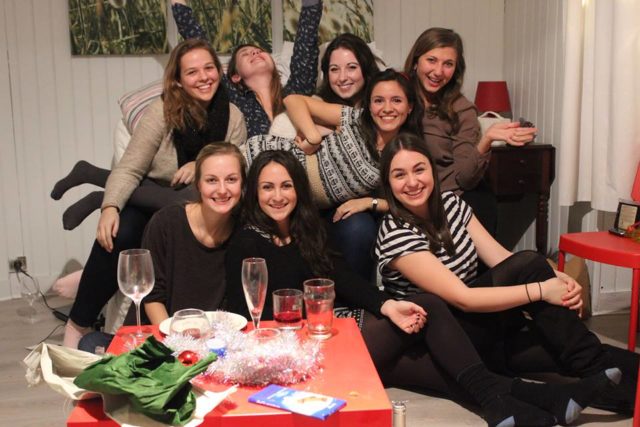Becoming an Au Pair in France

So you’re thinking about becoming an au pair, huh? Truth be told, it wasn’t even something I’d thought much about. Once it became clear how dismal the job market was for opportunities in my field, however, it became a far more serious prospect. It’s time-consuming and can be expensive, but if your dream has always been to live abroad, there’s really not too many better ways to do it.
So many of your expenses are paid for, plus you get to be a part of a family and really learn about their way of life. I knew I wanted to travel, and with nothing concrete tying me down, there was nothing to stop me from packing up and moving myself across the pond to spend a year in the City of Light. I will warn you though, there’s a fair amount of paperwork involved.
Becoming an Au Pair in France
1. Find a family
This is arguably the most difficult part of the process. You need to find a family with whom you will be compatible, who you can stand working for/possibly living with for a full year, and oh yeah- you need to do it all without meeting them in person. Fortunately with the miracle that is Skype, you’ll get the chance to chat with them face to face and find out what their expectations are. But I’m getting a bit ahead of myself here.
I found my family on aupair-world.net after receiving recommendations from friends who had au paired in the past. The website is great–user friendly and free for au pairs, but the families have to pay, so you have a bit more security. You sign up, write a short bio and greeting to the family, and then you can contact families or they can contact you.
The other option besides websites like this is to use an agency. This can be helpful if you end up not liking your family, because it’s the agency’s job to re-place you if things don’t work out. However, it depends on whether you want to pay the agency fees.
I eventually decided I wanted to solely focus on improving my French, and to go to a big city where there would be lots of things to do and people to meet.
Many big cities have great au pair networks through Facebook where au pairs will post if they’re leaving their families and looking for a replacement, so it’s not difficult to get out if you find yourself in a less-than-desirable situation.
I decided I could deal with it myself, so I began chatting with different families from France, Spain, Switzerland, Italy and Belgium. I eventually decided I wanted to solely focus on improving my French, and to go to a big city where there would be lots of things to do and people to meet, so I sought out and began conversing with a family in Paris.
They offered a live-out situation that would give me my own apartment, which I liked, and their kids were old enough to have rational conversations, which was essential for me.
Ask a lot of questions, and don’t be hesitant to ask the potentially taboo ones like salary and perks
There are families across the board–one kid, four kids, babies, teenagers–pretty much any dynamic you could be searching for. It’s best to get a clear idea in your mind of the kind of family you would be compatible with before you get too far into discussions with anyone. This way, if you’re ultimately going to decide that you don’t want to work for them then they should know as soon as possible so they can find someone else.
Skype with them and talk to both the parents and the kids so you have a preliminary idea of how interactions will go. Ask a lot of questions, and don’t be hesitant to ask the potentially taboo ones like salary and perks (phone, metro pass)–you’ll be a part of their family for a year, so they should be open to answering these. Ask if you can talk to the former au pair, if they’ve had one before. Make sure you feel sure that this will work out for a year.
2. Write a contract
Once you’ve found a family that you’re excited about and can’t wait to go live with, you’ll need to write up an au pair contract. You can find plenty of sample versions online, but chances are if your family’s had an au pair before, they already have a template that they’ll just need you to sign. When they send it to you, read it over several times. Get some help translating parts if you have to. My contract initially said I only had one day off a week, when we had discussed me having weekends free.
I pushed on that aspect, pointing out that what we had agreed upon and what was in the contract were two different things, and they changed it. That contract will be your main bargaining tool if things don’t go the way you want them to because the family signed it too, so make sure you know it backwards and forwards.
3. Enroll in a language school
With the au pair contract, you’ll have to send a number of papers to your host family so they can get your application approved (more on that in the next step). One of them is proof of enrollment in a language school. Au pairing in France is seen as a cultural exchange, and you are meant to be learning about France while you are here, especially the language.
Though the government says you have to be taking 10 hours of French classes a week, that’s not necessarily true–I know of au pairs who have taken one class per week and got approved because they paid the registration fee for the school, which is valid for one school year. This paper stating the year-long validity is what you need for the application; you don’t technically have to attend the classes, though I would recommend that you do, especially if you speak English with the family.
4. Get approved
Now comes the tricky parts. Once you sign the contract with your host family, you have to send them original signed copies of the contract so they can submit them to the DIRECCTE, which is the agency that handles work and employment in France. The process to get them approved by the DIRECCTE can take up to two months, so it’s best to get this moving because there are a lot of other steps to follow.
Once the family receives the stamped contracts back, they have to send the original copies back to you so you can bring them to your visa application appointment. This all generally requires a lot of FedExing, so you should calculate those fees into the overall costs of moving abroad to be an au pair (sorry, it’s not cheap).
The other papers you will need to submit with the contract are:
- A copy of your most recent diploma and a copy translated into French
- A health certificate from within the last 3 months certifying that you are healthy enough to work as an au pair
- Copy of your passport
- Motivation letter written in French (even basic French if that’s your level)
5. Obtain a visa
As soon as you decide upon a family, you should go ahead and check with the French consulate for your region to see when the next available visa appointments are. Sometimes during high volume application times, such as when university students are applying for study abroad visas, these appointments can be extremely difficult to get, so make one as soon as possible.
It’s much easier to change the appointment later than to discover that there are no appointments left at all. As regional consulates can also be fairly far away from your home in the US, it’s also best to know your appointment time as early as possible so you can make travel plans.
You’ll need a fair amount of paperwork, the list of which can be found on the consular website, but it is as follows (all items here + 1 copy):
- Passport and copy of identity pages
- Processing fee (currently $104 US, must be paid in cash)
- Two ID photos
- Visa application form
- Approved au pair contract
- Proof of previous studies (copy of diploma)
- Proof of registration in a language school in France
- Residence form
- Prepaid self-addressed FedEx envelope with tracking
If you don’t forget anything, the actual process of applying for the visa is fairly painless, but there were girls in the waiting room with me who had to leave, find somewhere to take ID photos, and come back. It’s not worth the risk so triple check to make sure you have everything in advance.
They also asked me when my planned departure to France was; fortunately I had thought to bring a copy of my flight itinerary (they say not to book until your visa is approved but financially that’s often just not possible). Bring that with you, because they may ask to see it.
6. Go to France
Once your visa application has been accepted, it will take up to 21 days to receive your passport back with the visa in it. I received mine in about a week and a half, plenty of time before my flight to Iceland, where I spent two days before continuing on to Paris. Some families will help pay for your flight over, but most won’t (too much of a risk for them), so add that to your estimated costs. But get excited–you’re moving to France!
7. Make an appointment
Once you arrive in France, you have a month-long window to make an appointment for the OFII (Office français de l’immigration et de l’intégration), which is the French immigration office. I’ve read several different takes on the process, but I ended up going to the south of the city to Cite Universitaire where students go to register for health coverage.
I had to queue for close to two hours for a process that took all of ten minutes–I gave them my passport and ID photos, told them I was an au pair, and they gave me a choice of appointment date and time to go to the OFII office for the medical examination. All that transit and waiting time for that? Bienvenue en France, I suppose.
8. Take your top off
Okay, so this one is kind of misleading. You do have to take your top off, but it’s in a closed space with medical professionals who see more boobs in a day than most people will see in a lifetime. So the date of my OFII appointment arrived, and true to personal form, I was late. I was reprimanded by the man at the front desk when I showed him the paper they had given me at Cite Universitaire with my appointment date, but he allowed me to go upstairs anyway and join the very long queue for the medical examination.
When my name was called, they brought me into a room, weighed me, measured me, and explained the X-ray process. France still screens for tuberculosis in all of its immigrants, so part of the examination includes a chest X-ray (hence having to take your top off). I went back into the waiting room until my name was called again for the X-ray, and I was brought into a hallway where there were three little changing rooms.
It can be done in English, but I did my best to complete it in French.
I went into one and disrobed from the waist up, and an all-business female technician came to the door on the other side, led me into the room, and they showed me where to stand. In fact, was in and out in 30 seconds, and went to put my clothes back on. I sat back in the waiting room again until my name was called for a third and final time, and I was ushered into a room with a very kindly doctor who asked me some simple questions about my diet, medical history, exercise regime, etc.
This can be done in English, but I did my best to complete it in French. Contrary to all the horror stories I’d read about judgmental doctors at the OFII, this lady was perfectly lovely, and gave me a big smile as I left. This time I was to go to the outer waiting room to turn over my papers for the titre de sejour, or residence permit.
9. Get a shiny sticker
In the outer waiting room, I was called up to the desk and asked for my paperwork. This included my passport, a copy of my passport and visa, an ID photo (which I ended up not needing), the attestation paper that stated that my residence was with my host family, the appointment paper I had received at Cite Universitare, anything the medical people had just given me, and the printed receipt for the timbre (sticker) I had paid for online before coming to the appointment (this is obligatory, and if you don’t have it, you’ll be forced to come back another time. It costs 58€).
I expected to turn in this paperwork and be told when I had to come back, but the man at the desk instead took my passport and affixed my shiny titre de sejour sticker onto a blank page, declaring that I was now a legal resident of France. Whee!
10. Get a social security number
Once you have your titre de sejour, you can apply for a social security number so that you can get a carte vitale (insurance card) so that you’ll get reimbursed partially or fully for any medical costs you may incur while living in France. This can be a very. long. process. Getting the social security number is relatively easy.
You mail yet more paperwork to the CPAM (Caisse Primaire d’Assurance Maladie, or health insurance office)–you don’t actually have to go there. I visited the office three times with varying amounts of paperwork before they told me that I needed to mail it in. Very frustrating, because it meant I could have applied for the number several weeks prior.
Here’s what you’ll need for becoming an Au Pair in France:
- A first matriculation form filled out (they gave me a copy of this but it can be found on their website)
- A copy of your passport and visa
- An original relevé d’identité bancaire (a piece of paper stating that you have a French bank account, given to you by the bank when you open your account)
- A copy of the OFII titre de sejour sticker
- A copy of your work contract (this is why it’s important to hang on to all those copies!)
- An attestation d’hebergement (a written statement by your host family saying that you live with them)
- A copy of your birth certificate and certified translation into French
- A copy of one of your host parents’ passports (not sure if I really needed this but I sent it in anyway)
Once they send your social security number, you should shortly thereafter receive a letter with the carte vitale application form, which you fill out and send back along with an ID photo and a copy of a form of identification (visa, titre de sejour, etc) and you will supposedly receive the card within 3-4 weeks. I’ve heard of it taking much longer, but as I’m still in the process of getting a social security number even six months later, I cannot say for sure.
It’s a lot of paperwork and a lot of money. And, it can be a hassle. But honestly, I’ve found au pairing to be a major test of who I am. And who I will grow into as a person, and have fallen so in love with living in France that even all this work seems in my mind to be but a minor inconvenience.
It’s a lot of paperwork and a lot of money. And, it can be a hassle. But honestly, I’ve found au pairing to be a major test of who I am. And who I will grow into as a person, and have fallen so in love with living in France that even all this work seems in my mind to be but a minor inconvenience.
It’s worth knowing that you’ll have to do all of this in advance so you know what to expect before deciding to become an au pair. But I hope that this doesn’t turn anyone off from having one of the most incredible experiences of their lives.

Becoming an Au Pair in France
Related Reading
Have you traveled to Paris, France? What were your impressions? Email us at editor@pinkpangea.com for information about sharing your experience and advice with the Pink Pangea community. We can’t wait to hear from you.
Becoming an Au Pair in France photo credits: Emily Jackson and Pixabay.








Hi Emily! thank you so much for such informative blog! I am currently on the process of obtaining all documents for my Au Pair Visa and have lots of questions to be honest. I already found a host family and we’ve video called twice and I am certain I found the right family i can live with a year. I am already 30 years old currently and will turn 31 on November so i am trying to have the paperworks done as soon as I can so I can apply for the visa before i’ll turn 31. Now that I’ve read in your blog that it will take almost 2 months for the DIRECCTE to stamp my documents, sweat started to form in my armpits lol. How long did you wait for the DIRECCTE’s approval stamp?
Hi Emily, i want to ask you some information please can you answer me?
im moroccan girl i want to go as an aupair to a host family in spain.
you have any information about the visa au pair between EU and an other country out of EU??
can you help me please??